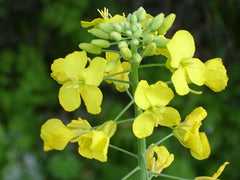Lupinus Perennis, Sundial Lupine, Perennial Blue Lupin
An easily grown plant, succeeding in any moderately good soil in a sunny position. Grows well in a poor sandy soil. Requires an acid to neutral soil.
Plants are hardy to about -25°c. This species is very susceptible to slug damage.
This species has a symbiotic relationship with certain soil bacteria, these bacteria form nodules on the roots and fix atmospheric nitrogen. Some of this nitrogen is utilized by the growing plant but some can also be used by other plants growing nearby.
Pre-soak the seed for 24 hours in warm water and then sow in early spring in a greenhouse. Germination should take place within a couple of weeks. When they are large enough to handle, prick the seedlings out into individual pots and plant them out in early summer.
It should also be possible to sow the seed outdoors in situ in the middle of spring. It might be necessary to protect this sowing from mice.
Edible uses:
Seed - cooked. Used as a protein-rich vegetable or savoury dish in any of the ways that cooked beans are used, they can also be roasted or ground into a powder. The seed has a bitter flavour due to the presence of toxic alkaloids, it should be thoroughly leached before being cooked.
Seedpods - cooked.
The seed of many lupin species contain bitter-tasting toxic alkaloids, though there are often sweet varieties within that species that are completely wholesome. Taste is a very clear indicator. These toxic alkaloids can be leeched out of the seed by soaking it overnight and discarding the soak water. It may also be necessary to change the water once during cooking. Fungal toxins also readily invade the crushed seed and can cause chronic illness.


![By Bruce Ackley, The Ohio State University, Bugwood.org [CC BY 3.0 (http://creativecommons.org/licenses/by/3.0)], via Wikimedia Commons](http://www.openpollinated.co.uk/cdn/shop/products/Amaranthus_green_medium.jpg?v=1510586902)


![By Koba-chan (Own work) [GFDL (http://www.gnu.org/copyleft/fdl.html), CC-BY-SA-3.0 (http://creativecommons.org/licenses/by-sa/3.0/), CC BY-SA 2.5 (https://creativecommons.org/licenses/by-sa/2.5) or CC BY 2.5 (http://creativecommons.org/licenses/by/2.5)], via Wikimedia Commons](http://www.openpollinated.co.uk/cdn/shop/products/Fagopyrum_esculentum_flower_jp_medium.jpg?v=1512568112)

![Evelyn Simak [CC BY-SA 2.0 (http://creativecommons.org/licenses/by-sa/2.0)], via Wikimedia Commons](http://www.openpollinated.co.uk/cdn/shop/products/A_crop_of_red_clover_adjacent_to_Mill_Lane_near_The_Carr_-_geograph.org.uk_-_548507_medium.jpg?v=1510586756)
![Photo By User: Carstor (Own work (own picture)) [GFDL (http://www.gnu.org/copyleft/fdl.html), CC-BY-SA-3.0 (http://creativecommons.org/licenses/by-sa/3.0/) or CC-BY-SA-2.5-2.0-1.0 (http://creativecommons.org/licenses/by-sa/2.5-2.0-1.0)], via Wikimedia Commons.](http://www.openpollinated.co.uk/cdn/shop/products/1_2c497e85-b5e9-4bf4-ab29-f2fdc3d9e689_medium.jpeg?v=1510586878)